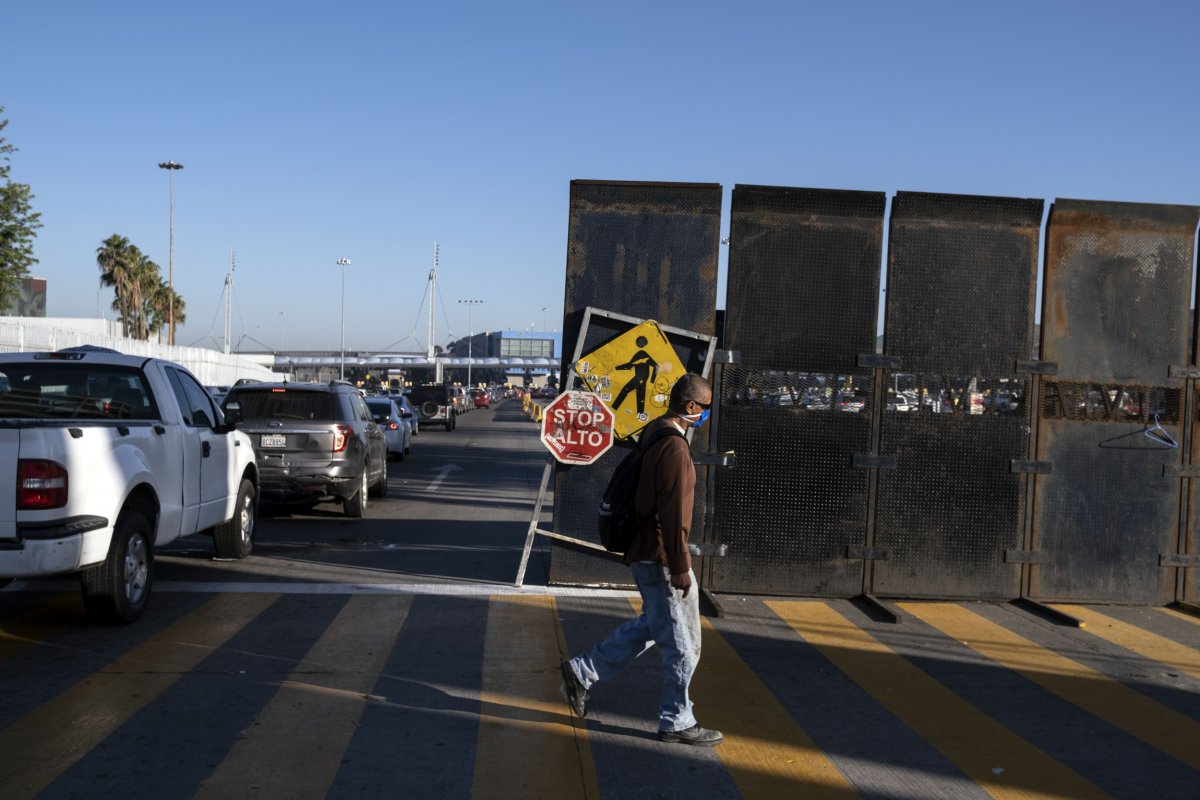Residents of Sonoyta, the Mexican border town facing Lukeville, Arizona, formed a blockade at the border over the weekend in a bid to block Americans from entering the country amid a rise in the U.S. state's coronavirus cases.
On Saturday, Sonoyta residents used their cars to form a blockade on the main road into the border town, briefly preventing drivers from crossing into Mexico.
The border crossing is known as the fastest route to get to the seaside resort of Puerto Peñasco, also known as Rocky Point.
Speaking with Newsweek, Carlos Eduardo Chávez Jacquez, who helped organize the demonstration and runs a Facebook page titled "Sonoyta Unido Jamás Será Vencido," or "United Sonoyta Will Never Be Defeated," said protesters would be forming another blockade on Monday.
With coronavirus cases rising in Arizona, he said, it was not safe for people from the U.S. to be crossing into Mexico, particularly for non-essential purposes like tourism.
As of Sunday, there were 3,536 coronavirus cases reported in Arizona, according to the state's Department of Health Services. Overall, the state has seen more than 98,000 cases so far, with 1,809 people dying from COVID-19.
"Everywhere people are dying from COVID-19 because we weren't ready for this," he said. "Yes, I support tourism, I want people from all over the world to come to Mexico and see how pretty we are and enjoy the culture, but why during COVID-19 times?"
Despite concerns from residents of Sonoyta, Chávez Jacquez said the local government in Rocky Point has been fighting to have tourism seen as an "essential" industry for the local and national economy.
While he agrees that tourism is important, he said that in towns like Sonoyta, where limited investments have been made in the local health infrastructure, ushering in tourists during a pandemic could prove deadly for residents.
"And if the U.S. isn't ready, why would Mexico be ready? We are not ready for COVID-19 tourism right now. I support tourism, it's important for the economy, but why now?" he said.
On Saturday, Sonoyta Mayor José Ramos Arzate appeared to agree, issuing a statement the same day urging U.S. tourists "not to visit Mexico."
People from the U.S., Ramos Arzate said, should only be crossing into Mexico "for essential activities, and for that reason, the checkpoint and inspection point a few meters from the Sonoyta-Lukeville AZ crossing will continue operating."
In the lead-up to the July 4th weekend, there had already been fears that people from the U.S. traveling into Mexico could bring the coronavirus with them amid a rise in cases in Arizona.
Despite the focus on essential border crossings only between the U.S. and Mexico amid the coronavirus outbreak, people from the U.S. are also known to cross the border for leisurely travel, as well as for low-cost medical and dental treatment.
Mexico and the U.S. had already agreed to block non-essential travel both ways at the border. However, Mexican officials have suggested that not enough has been done on the Mexican side to enforce that policy.
Ahead of the weekend, Mexico's Foreign Relations Department did announce, however, that the country would be enforcing screenings for visitors from the U.S., including checking temperatures and questioning travelers on potential symptoms of coronavirus.
In a statement sent to Newsweek, Adrián Esteban Santos Ruíz, a spokesperson for Mexico's embassy in Britain, told Newsweek that the Mexican government "implemented measures on various border points and highways...especially this past weekend due to the celebrations of the 4th of July."
"We urged people to avoid non-essential trips to Mexico in order to prevent the spread of the pandemic caused by COVID-19," the spokesperson said. "The Ministry of Foreign Affairs, through the network of Consulates of Mexico in the U.S.—especially in border states—called on all Mexican and foreign people to avoid international travel to and from Mexico, except in cases justified as essential or that cannot be postponed."
Additional "Sanitary filters," which saw people looking to cross into Mexico forced to verify the nature of their trip, as well as their health status, were further installed along various border ports and highways between Thursday, July 2 and Sunday, July 5, he said.
However, Chávez Jacquez said that is not enough. The Mexican government, he said, should be prioritizing residents' health, rather than focusing on the economy, particularly when it serves to benefit some towns, like Rocky Point, over others the most.
"We have the support of Mexican citizens," he said. "We are so tired of the Mexican government putting money over people."
This article has been updated with statements from blockade organizer Carlos Eduardo Chavez Jacquez, as well as from the Mexican embassy in Britain.

Uncommon Knowledge
Newsweek is committed to challenging conventional wisdom and finding connections in the search for common ground.
Newsweek is committed to challenging conventional wisdom and finding connections in the search for common ground.
About the writer
Chantal Da Silva is Chief Correspondent at Newsweek, with a focus on immigration and human rights. She is a Canadian-British journalist whose work ... Read more
To read how Newsweek uses AI as a newsroom tool, Click here.








